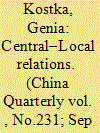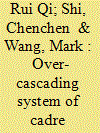| Srl | Item |
| 1 |
ID:
155663


|
|
|
|
|
| Summary/Abstract |
Recent literature on environmental governance in China frequently ascribes blame for China's environmental problems to sub-national governments' lax environmental enforcement. Such research implicitly assumes that more central control would lead to better results but, as yet, the role of the centre in environmental governance remains underresearched. In the context of the current phase of recentralization, this article studies central and local interests, capacities and interactions across policy issues and government agencies. By “bringing the centre back” into the study of central–local relations in China, we examine both where such recentralization has in fact occurred and whether such recentralization efforts have improved environmental outcomes. We argue that centralization does not improve outcomes in every case. Further, central and local levels of governance are not as different as they might seem. Indeed, there are significant areas of overlapping interests and similar patterns of behaviour, both positive (enforcement) and negative (shirking), between central and local administrations. The results draw an empirically and theoretically rich picture of central–local relations that highlights the innate complexity of China's environmental governance patterns during the current phase of recentralization.
|
|
|
|
|
|
|
|
|
|
|
|
|
|
|
|
| 2 |
ID:
119187


|
|
|
|
|
| Publication |
2012.
|
| Summary/Abstract |
This paper analyses Chinese sub-national governments' implementation strategies to meet national energy efficiency targets in the 11th Five-Year Plan (2006-2010). Previous research has focused on the ways governance practices and decision-making structures shape implementation outcomes, yet very little attention has been given to what strategies local leaders actually employ to bridge national priorities with local interests. To illustrate how local leaders work politically, this paper highlights specific implementation methods officials use to strengthen formal incentives and create effective informal incentives to comply with energy efficiency mandates. The analysis is drawn from 53 interviews conducted in June and July of 2010 in Shanxi, a major coal-producing and energy-intensive province. Findings suggest that local government leaders conform to national directives by "bundling" the energy efficiency policy with policies of more pressing local importance or by "bundling" their energy efficiency objectives with the interests of groups with significant political influence. Ultimately, sub-national government officials frame policies in ways that give them legitimacy at the local level.
|
|
|
|
|
|
|
|
|
|
|
|
|
|
|
|
| 3 |
ID:
178173


|
|
|
|
|
| Summary/Abstract |
China’s cadre evaluation system – the personnel management system used to assess the performance of government officials in the party-state – is considered an important tool for upper-level governments to supervise and regulate lower-level agents. This system is one of the key factors contributing to the Chinese Communist Party’s (CCP) authoritarian resilience. Deficiencies of this system are exemplified by the ‘blind pursuit of GDP’, selective implementation, gaming, collusion, and data fabrication. The CCP has been reforming this system to strengthen its monitoring and political control over local government cadres, especially at the county level, and it is a crucial component in the step-by-step hierarchical power structure. While current literature focuses largely on the assessment content of such reform, this article pays specific attention to the changes in the cascading evaluation structure of province to prefecture to county. The article identifies a new dynamic of ‘over-cascading’ whereby provincial governments bypass prefectural governments and directly evaluate county officials, resulting in the co-existence of prefecture-county and province-county evaluations. This article also explores the functioning mechanism of this dual structure and argues that this structural change in the cadre evaluation system is breaking the traditional hierarchical governance structure and enhancing authoritarian resilience of the CCP because it provides a new route for over-cascading governance between provincial and county governments. This research contributes to the conceptualization of the over-cascading governing structure of the CCP and fills gaps in the literature on structural changes in China’s cadre evaluation system.
|
|
|
|
|
|
|
|
|
|
|
|
|
|
|
|